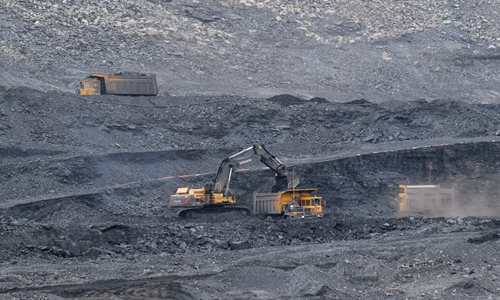
A coal mine in Shuozhou, North China's Shanxi Province Photo: cnsphoto
A persisting supply glut in China's coal industry in recent weeks is increasing the likelihood that China will restrict Australian coal imports as bilateral ties plunge to their coldest point in decades, Chinese analysts said Thursday.
The comments come as suggestions rise in China to hit Australian coal exports to the country, worth $64 billion in 2019, as Australia moves to do the US' bidding to undermine China's interests, including the announcement of a pending new investment regulation that virtually denies Chinese investors access to all valuable sectors.
China has in recent weeks imposed a ban on beef imports from four Australian meatworks, as well as an 80-percent anti-dumping tariff on barley, and warned Chinese tourists and students about traveling and studying in Australia over racism there.
Li Chaolin, an expert at the China Coal Transportation and Sale Society, said the domestic glut has put Australian coal imports in a vulnerable position.
"Oversupply, high inventory at ports, and weak prices have put huge pressure on China's own coal producers, which are playing a role in ensuring jobs and incomes in the wake of the economic impact of the COVID-19 epidemic," Li told the Global Times on Thursday.
A report by the Economic Information Daily on Monday cited industry insiders as saying that imported coal has been squeezing the market share of domestic miners and contributing to coal price fluctuations.
Some domestic coal miners face a financial meltdown if production and sales of coal are halted for 10 days, the report said.
In May, media reports said the Chinese government has told some power plants in China to stop importing Australian coal, causing heated discussion in Australia.
Chinese analysts said the government is walking a tightrope in keeping coal mines afloat without pushing fuel costs too high for power plants, which may impede the resumption of work and production in the country.
Lin Boqiang, director of the Center for Energy Economics Research at Xiamen University, said China's reliance on Australian coal is very limited, which gives policymakers more room to maneuver compared with other Australian commodities sent to China, such as iron ore.
The latest available customs data showed that China imported 72.05 million tons of coal from Australia in the first 10 months of 2019. To put that in perspective, China's coal consumption in the first three months of 2020 alone stood at 870 million tons, according to the China National Coal Association.
Meanwhile, China accounts for about 19 percent of Australia's coal exports.
"If coal imports shrink, the Chinese coal industry would be very happy," Lin told the Global Times on Thursday.
Analysts said that Russia, which aims to increase its coal exports to China to 55 million tons by 2025, is expected to benefit.
Under a government drive to increase exports to Asia, Russia exported 18.34 million tons of coal to China in March, making it the largest exporter to China for the month.


